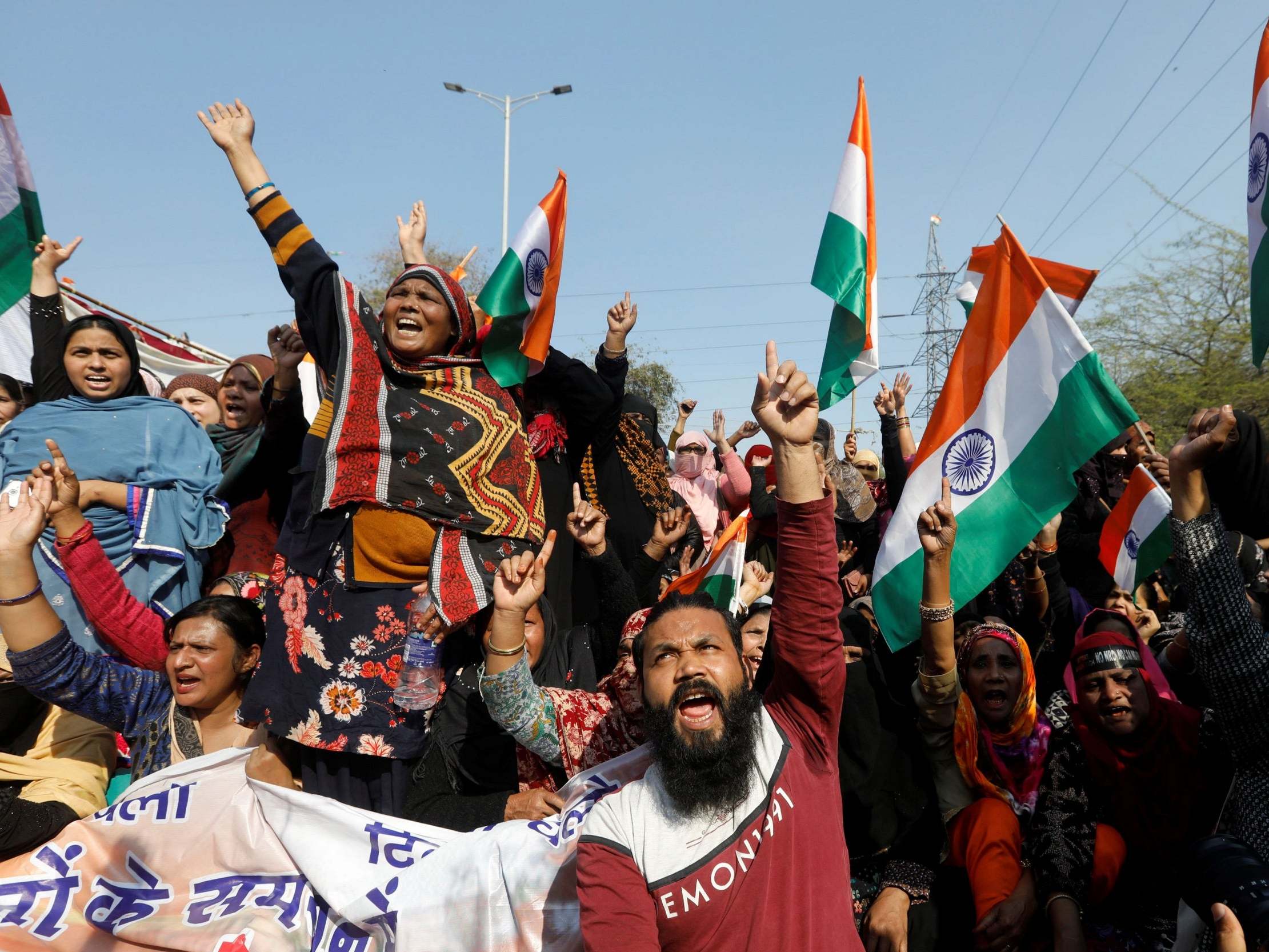Delhi citizenship protests could be suspended as authorities ban large gatherings over coronavirus
After city authorities ban all gatherings of more than 50 people – except weddings – protest leaders tell Adam Withnall discussions are under way to decide if they will comply with the order


The Indian capital Delhi has invoked colonial-era emergency laws to shut gyms, night clubs and spas and ban all gatherings of over 50 people, a move that could lead to the city’s months-long citizenship protests being suspended.
The city’s chief minister, Arvind Kejriwal, said on Monday afternoon that the order was effective immediately, and confirmed it would also apply to the large sit-in protests against Narendra Modi’s new citizenship laws that have been held non-stop in the eastern Shaheen Bagh neighbourhood since mid-December.
“[The ban] will be applicable for everyone, be it protest or any other gathering,” Mr Kejriwal told a news conference. The new order adds to the earlier closure of schools and cinemas, all until at least 31 March.
Large weekly markets will also be suspended, and a reference to “religious” gatherings in the order suggests temples, mosques, churches and other houses of worship may also be shut down.
There is one exception, however – weddings, traditionally a huge event in India, will be exempt from the ban. “Marriage functions will be out of its purview as of now but we appeal to people to postpone weddings if possible,” Mr Kejriwal said.
Delhi has seven confirmed cases of Covid-19 infection, while only 114 cases have been identified across India as a whole. However, experts have said “we can’t be sure” how widely the virus is really spreading because, as of this weekend, only 6,000-7,000 tests have been carried out on a population of almost 1.4 billion.
It remains to be seen whether the anti-citizenship law protesters will comply with the government order.
The Shaheen Bagh sit-in, led by a core group of around 500 women, are demanding amendments to a new law that grants a path to citizenship for refugees of every major South Asian religion except Islam.
Protesters say that the law, pushed through in the second week of December by Mr Modi’s Hindu nationalist administration, could be combined with a new “National Register of Citizens” to deny Muslims citizenship.
Two protest leaders told The Independent that it was “still to be decided” whether the sit-in would disband, saying the matter was “being discussed internally” on Monday evening. A decision was not expected to be made today.
But if the protesters are looking for an international comparison, the French “gilets jaune” movement defied a ban on gatherings of more than 100 people to march through the streets of Paris on Saturday, albeit in much-reduced numbers compared to previous weeks.
If the Shaheen Bagh protest does persist, it will give ammunition to the movement’s vocal critics in Delhi and across the country. Anger towards the peaceful protesters – and nationalist politicians’ calls for them to be cleared off the streets – sparked the beginning of the Delhi riots last month, in which 53 people died.
Mr Kejriwal insisted Delhi’s measures under the 1897 Epidemic Diseases Act – first introduced by the occupying British forces to counter the plague – were still pre-emptive, saying that 500 hospital beds had been set aside for infected patients but that “there is no need for them as of now ... in India, community transmission has not started”.
The federal Indian government has taken drastic measures to try and stop virus cases entering the country, enforcing an unprecedented month-long ban on all tourism and warning Indian nationals abroad that they could face quarantine on their return.
And amid complaints by some international travellers arriving in Delhi about the state of their quarantine accommodation, Mr Kejriwal said hotels near the capital’s airport had been ordered to make rooms available for those in enforced isolation – although travellers will have to pay for the privilege. “Many people coming from abroad who are being quarantined require high-end facilities,” he said. “Delhi government has asked three hotels near the airport to set aside 182 rooms for this purpose, at a fixed price.”
Join our commenting forum
Join thought-provoking conversations, follow other Independent readers and see their replies
Comments